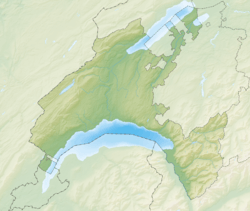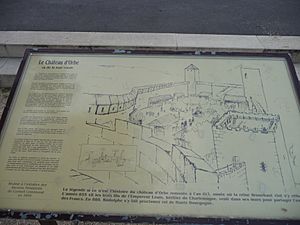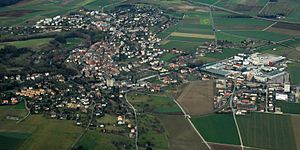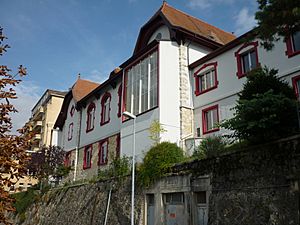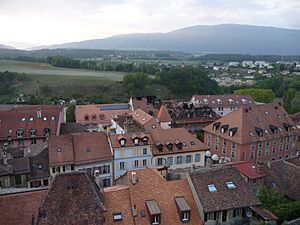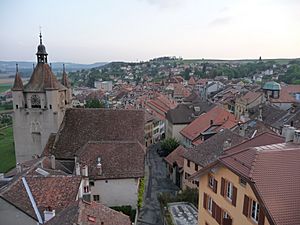Orbe facts for kids
Quick facts for kids
Orbe
|
||
|---|---|---|
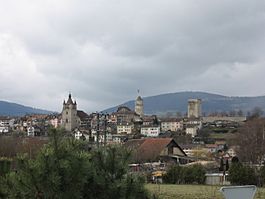
Orbe town
|
||
|
||
| Country | Switzerland | |
| Canton | Vaud | |
| District | Jura-Nord Vaudois | |
| Area | ||
| • Total | 12.05 km2 (4.65 sq mi) | |
| Elevation | 479 m (1,572 ft) | |
| Population
(Dec 2020 )
|
||
| • Total | 7,108 | |
| • Density | 589.88/km2 (1,527.8/sq mi) | |
| Postal code |
1350
|
|
| Surrounded by | Agiez, Arnex-sur-Orbe, Chavornay, Épendes, Essert-Pittet, Mathod, Montcherand, Valeyres-sous-Rances | |
Orbe is a charming town, also known as a municipality, in Switzerland. It's located in the canton of Vaud. Orbe used to be the main town of the Orbe district. Now, it's part of the larger Jura-Nord Vaudois district.
Contents
Discovering Orbe's Past
Orbe has a long and interesting history! It was first mentioned around the year 280. Back then, it was called Urba. Later, in 1179, people referred to it as versus Orbam.
Orbe in Ancient Times
During the time of the Roman Empire, Orbe was known as Urba. It was a town in a region called Gallia, where the Helvetii people lived. Ancient maps, like the Antonine Itinerary, show its location between other Roman settlements.
On a nearby hill called Boscéaz, you can still see the amazing remains of a huge and fancy Roman villa. This villa has beautiful, detailed mosaics that are still visible today.
Orbe in the Middle Ages
In the Middle Ages, Orbe became a very important place. It was located on a key road over the Jougne Pass. It also sat at the crossroads of two major trade routes. One route went from the Jura Mountains to the Alps. The other connected the Rhine River to the Rhone River.
The town grew on both sides of the Orbe River. Eventually, a bridge was built to connect the two parts. The Orbe Castle and the town's market were built on the hill above the river and the bridge.
In 888, the town was owned by King Rudolf I of Burgundy. Later, between 937 and 993, Orbe even had its own mint that made silver coins for Conrad the Peaceful. Orbe remained part of the independent Kingdom of Burgundy until 1032. After the last king died, Orbe became part of the Holy Roman Empire.
Over time, different nobles owned parts of Orbe. In 1233, the Counts of Montfaucon-Montbeliard built a round tower, called a keep, in Orbe Castle. They also built new parts of the town to help protect it. By making the town and castle strong, they could control the important trade routes that passed through the valley.
Orbe's Modern History
In 1352, Orbe received a special town charter. This meant it had certain rights and rules, similar to the town of Moudon.
The town was later captured by the Swiss Confederation in 1475 during the Burgundian Wars. However, they couldn't hold it for long. After the Swiss won the Burgundian Wars, Orbe became a shared territory. It was managed by Bern and Fribourg until 1798.
In 1798, the French invaded Switzerland. This led to the creation of the Helvetic Republic, which was supported by France. Orbe became the capital of its own district during this time. The people of Orbe, especially those in the towns, liked the new ideas of the French Revolution. However, many Swiss people didn't like the changes. The Helvetic Republic was eventually overthrown. Orbe remained the capital of its district under new Swiss laws.
Orbe's Location and Landscape
Orbe covers an area of about 12 square kilometers (about 4.6 square miles). A large part of this land, about 73.6%, is used for farming. Forests cover about 3.7% of the area. The rest of the land is made up of buildings, roads, and rivers.
The town is built on a hill that is partly surrounded by the Orbe River. Besides the main town, Orbe also includes several smaller villages, or hamlets. These include Granges Saint-Germain, Granges Saint-Martin, Mont Choisi, and Le Puisoir.
Orbe's Coat of Arms
The official symbol of Orbe, its coat of arms, shows two golden fish facing away from each other on a red background. This design is called Gules, two Sea-daces addorsed Or.
People of Orbe
Orbe has a population of about 5,757 people (as of 2022). About 28.6% of the people living in Orbe are foreign nationals. The population has grown quite a bit over the years, mostly due to people moving to the town.
Most people in Orbe speak French, which is about 82.3% of the population. The next most common languages are Portuguese (5.0%) and German (3.1%).
The town has a good mix of ages. About 11.3% of the population are children up to 9 years old, and 13.1% are young people between 10 and 19.
Many people in Orbe live in single-family homes. About 54.6% of the inhabited buildings are single-family homes.
The chart below shows how Orbe's population has changed over time:

Important Historical Sites
Orbe has several important historical sites that are recognized nationally. These include:
- The Boscéaz Roman villa.
- Orbe Castle, with its two towers and main square.
- The Swiss Reformed Church of Notre-Dame.
- The City Hall.
The entire old town of Orbe is also part of the Inventory of Swiss Heritage Sites.
The Gallo-Roman villa is famous for its incredible Roman mosaics. These mosaics are made of hundreds of tiny pieces on the floor. The villa was a palace that belonged to a very wealthy landowner. It was built around 160 AD and left empty around 270 AD. Today, eight of these mosaics can still be seen and visited!
Orbe's Economy
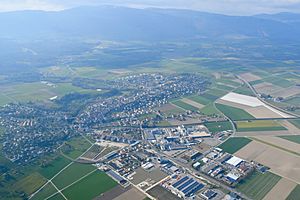
Orbe is home to a large Nestlé Research & Development factory. Over 500 people work there! This factory is responsible for making popular products like Nescafé and Nespresso. It contributes a significant amount to Nestlé's overall sales each year. The factory was first opened in 1901 by Daniel Peter, who invented milk chocolate, to help him make more chocolate. A tall chimney from the old chocolate factory is still standing today.
In 2010, Orbe had an unemployment rate of 7.5%. Many people in Orbe work in different areas. About 95 people work in farming. Over 1,100 people work in manufacturing and construction. More than 2,100 people work in service jobs, like sales, transportation, hotels, and healthcare.
Many people who live in other towns come to Orbe for work. Also, about 7.1% of the workers coming into Orbe are from outside Switzerland. Most people (66.2%) use a private car to get to work, while 10.6% use public transportation.
Since 1894, the town has been connected by the Orbe-Chavornay railway. This was actually the first electric railway in Switzerland!
Religion in Orbe
Based on a 2000 survey, about 34.5% of the people in Orbe were Roman Catholic. Another 38.8% belonged to the Swiss Reformed Church. There were also people who belonged to other Christian churches, as well as those who were Islamic or Jewish. A small number of people were Buddhist or Hindu. About 12% of the population said they didn't belong to any church or were atheist.
Education in Orbe
In Orbe, about 34.5% of the population has finished high school. About 8.4% have gone on to get a higher education from a university or a specialized college.
In the 2009/2010 school year, there were 802 students in the Orbe school district. The local government provides two years of optional pre-school. The primary school program lasts for four years, and the middle school program lasts for six years.
Orbe is also home to a museum called the Fondation Pro Urba. In 2009, about 2,900 people visited this museum.
Famous People from Orbe
- Adelaide of Italy (931–999): She was also known as Adelaide of Burgundy. She became a Holy Roman Empress by marrying Otto I, Holy Roman Emperor.
- Pierre Viret (1509/1510–1571): He was a religious leader and a key figure in the Protestant Reformation.
- Edmund Davall (1762–1798): He was a botanist (someone who studies plants) from Switzerland and England. He lived in Orbe starting in 1788.
Images for kids
See also
 In Spanish: Orbe (Vaud) para niños
In Spanish: Orbe (Vaud) para niños
 | Audre Lorde |
 | John Berry Meachum |
 | Ferdinand Lee Barnett |




